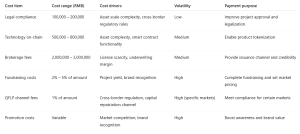5 Global Cities Where You Can Now Pay Rent in Bitcoin

Key takeaways
Remote workers and digital nomads can now pay rent in Bitcoin across major cities and coastal hubs.
Blockchain-powered rental platforms and smart contracts simplify lease management, reduce disputes, and enable secure, near-instant settlements.
Tenants and landlords can choose direct or indirect Bitcoin payments, with stablecoins, intermediaries or escrow services helping mitigate volatility and compliance risks.
Cities like Miami, Lisbon, Berlin, Toronto and Paris lead the trend, while hotspots like El Zonte and Rosario showcase how Bitcoin rentals are expanding worldwide.
Paying rent with Bitcoin (BTC) is no longer just a concept, thanks to technological advancements and adoption. For remote workers and nomads, it has become a practical option to pay for rental property in cities around the world. From major financial centers to crypto-friendly coastal towns, more landlords and property managers accept digital currencies as a convenient payment method.
Whether you are a digital nomad or remote worker, or someone avoiding traditional banking challenges, these cities make renting with Bitcoin straightforward. Thanks to blockchain-based transparent rental platforms and automated smart contracts, paying rent in Bitcoin provides speed, flexibility and global accessibility.
This article explains the reasons why paying rent in Bitcoin has become popular. It discusses the top five cities where Bitcoin rentals have become socially acceptable. It also talks about the places that have been in the news regarding crypto-backed rentals and tells how to find and secure them.
Why paying rent in Bitcoin is gaining popularity
As cryptocurrencies gain mainstream acceptance, Bitcoin is emerging as an alternative payment option beyond just trading and investing. Renting property with Bitcoin is becoming attractive to both tenants and landlords, thanks to its advantages:
Rise of blockchain-powered property management: Rental platforms integrated with blockchain-based smart contracts automate lease agreements, streamline payments and reduce disputes, making transactions transparent and secure.
Near-instant settlements: Bitcoin enables near-instant settlements without delays or banking fees (though users pay a gas fee for Bitcoin transactions). It is invaluable for international tenants and property owners managing cross-border properties.
Avoid costly currency conversions: Paying rent in Bitcoin helps you set aside expensive conversions in fiat currencies. According to YCharts, the average cost of a Bitcoin transaction was $1.064 on July 27, 2025.
Notwithstanding the benefits, taking into account Bitcoin’s fluctuating value and jurisdictional laws is important for tenants and landlords.
Did you know? Blockchain-based leases reduce disputes by timestamping payments and automating terms, building trust between landlords and tenants globally.
Direct and indirect Bitcoin payment for rentals
Depending on the region, rent can be paid directly or indirectly in Bitcoin.
In direct crypto payments, the tenant sends Bitcoin (or another cryptocurrency) directly to the landlord’s digital wallet. The payment stays in cryptocurrency unless the landlord later converts it to fiat currency. This method is fast, has low fees and is fully decentralized, but both parties face risks from price fluctuations and potential tax complications.
In indirect crypto payments, a third-party service like BitPay, Coinbase Commerce or a rental platform handles the transaction. The tenant pays in cryptocurrency, but the landlord receives fiat currency (such as USD or EUR). This protects landlords from price volatility and simplifies financial record-keeping while allowing tenants to use digital currencies.
Direct payments offer greater independence and suit situations where both parties are comfortable with cryptocurrency and the local laws fully support such transactions. Indirect payments, however, reduce regulatory challenges and are more convenient for landlords unfamiliar with digital assets.
Did you know? Global co-living networks targeting crypto professionals now accept Bitcoin, providing flexible housing for people avoiding traditional bank setups.
Top five cities for paying rentals in Bitcoin
The prospect of paying rent with Bitcoin is becoming a reality in an increasing number of cities worldwide. Here are the top five urban centers that are leading the charge in Bitcoin rental adoption:
1. Miami, Florida, United States
Playing host to the Bitcoin Conference each year, Miami is a city where crypto has the support of local leadership. Former mayor Francis Suarez even opted to receive his municipal salary in Bitcoin. Several luxury condo developers and apartment projects, such as The Rider Residences in Wynwood, accept cryptocurrency payments for purchases. In April 2025, a crypto transaction occurred for a unit there directly between digital wallets.
Although dedicated rental platforms aren’t widespread, tenants can still negotiate with landlords if monthly rent payments in Bitcoin are acceptable. In Downtown, Brickell, or Wynwood, select properties may be available for Bitcoin-based rentals.
2. Lisbon, Portugal
Since new rules regarding crypto-backed purchase and sale of property were introduced in April 2022, there has been a clear set of procedures. There is a growing digital‑nomad network centered in Lisbon, and crypto services designed to support them are increasing.
As reported on July 12, 2025, RentRemote partnered with BitPay to accept cryptocurrency as rent payment. While most transactions still convert Bitcoin to euros for legal settlement, many property sellers, developers and agencies are open to accepting crypto.
Property rentals in Bitcoin may be available in Lisbon’s prime neighborhoods like Chiado, Alfama and the startup districts. Tenants paying in Bitcoin usually work via notaries or brokers that handle conversion and compliance, making rent in Bitcoin feasible where both parties agree.
3. Berlin, Germany
Berlin has a progressive real estate sector that facilitates indirect Bitcoin rental adoption in several cases. Flatio, a European short‑term rental service, accepts Bitcoin payments in Berlin for stays lasting one to six months, though modest service fees may apply.
Since April 1, 2023, Germany’s Money Laundering Act has prohibited direct crypto-based property purchases. However, renting remains possible when parties agree to use intermediary services that convert Bitcoin to euros before payment clears. Berlin continues to attract tenants who prefer flexibility regarding payments.
4. Toronto, Ontario, Canada
Canada’s property landscape is gradually embracing Bitcoin. Some rental platforms in Toronto have enabled Bitcoin rent payments, letting tenants pay in Bitcoin while landlords receive fiat via exchange services.
Residents can book services, dinners, and rent using crypto throughout the city. While directly accepting Bitcoin as rent may still be a niche, the infrastructure exists to support crypto-savvy tenants. Some services handle conversion, invoices, and transparent transaction flows.
5. Paris, France
Paris is fast catching up with crypto hotspots to facilitate crypto-based rentals. Agencies like Lodgis, which specialize in furnished and short-term rentals, have offered clients the option to pay agency fees in Bitcoin since 2014.
There are real estate platforms that enable lease agreements or property sales in France using Bitcoin, ensuring compliance through PSAN‑certified partners and notaries. While full rent‑in‑Bitcoin rentals are rare, tenants and landlords can often find workable options.
Did you know? For expats and nomads, Bitcoin rentals simplify moving across borders by eliminating the need for local bank accounts or currency conversions.
Paying rent in Bitcoin? Real estate adopts crypto from El Zonte to Rosario
People are increasingly getting open to using digital assets like Bitcoin and Ether (ETH) for rent and deposits, signaling a significant shift in how real estate transactions are conducted.
El Zonte, El Salvador
El Zonte, known as “Bitcoin Beach” in El Salvador, pioneered community-wide Bitcoin adoption, influencing the country’s 2021 decision to make Bitcoin legal tender. Currently, studios or boutique apartments near the beach can be rented with payment in Bitcoin or any other acceptable cryptocurrency.
Ocean-view properties with Bitcoin payment options are available. Despite its modest infrastructure, this lively surf town continues to draw crypto-savvy digital nomads seeking a Bitcoin-integrated lifestyle.
Rosario, Santa Fe, Argentina
In early 2024, Rosario, Argentina’s third-largest city, hosted the country’s first rental agreement denominated in Bitcoin. Under this groundbreaking lease, the tenant agreed to pay the equivalent of $100 per month in Bitcoin, facilitated by the local crypto platform Fiwind, which converted USDT (USDT) to Bitcoin and transferred it to the landlord’s wallet.
This milestone followed pro-crypto reforms by President Javier Milei’s administration, which, through a December 2023 deregulation decree, allowed contracts in Bitcoin and other cryptocurrencies. However, the Argentine Congress didn’t approve the president’s crypto reforms, which were dropped. Argentina continues to treat crypto under its standard tax regulations, without the deregulated regime Milei initially envisioned.
How to find and secure Bitcoin-friendly rentals
You can use crypto real estate platforms and local blockchain-based rental apps for finding rentals that accept Bitcoin and other cryptocurrencies.
Some agencies or landlords may offer discounts to long-term tenants who pay with Bitcoin or stablecoins. During negotiations, confirm conversion rates, payment schedules and whether rent is tied to a specific cryptocurrency.
For security, you may use escrow services, which hold funds until both parties meet the agreed terms, reducing the risk of fraud. Always verify the landlord’s credibility through references or property documents, as cryptocurrency transactions cannot be reversed. Where feasible, use smart contracts to automate payments and protect both parties.
This article does not contain investment advice or recommendations. Every investment and trading move involves risk, and readers should conduct their own research when making a decision.













